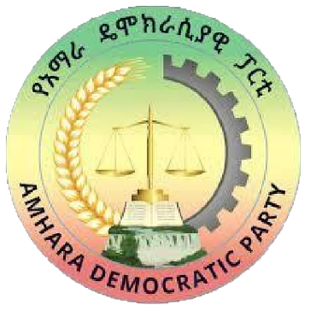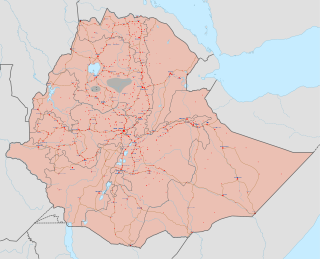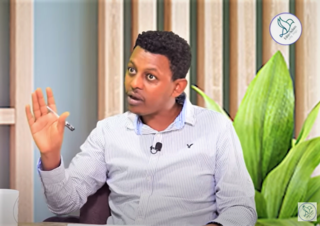| |||||
| Decades: | |||||
|---|---|---|---|---|---|
| See also: | Other events of 2019 Timeline of Ethiopian history | ||||
| |||||
| Decades: | |||||
|---|---|---|---|---|---|
| See also: | Other events of 2019 Timeline of Ethiopian history | ||||
| | This section needs expansion. You can help by adding to it. (October 2021) |
| | This section needs expansion. You can help by adding to it. (July 2019) |
The Ethiopian People's Revolutionary Democratic Front was an ethnic federalist political coalition in Ethiopia that existed from 1988 to 2019. It consisted of four political parties: Tigray People's Liberation Front (TPLF), Amhara Democratic Party (ADP), Oromo Democratic Party (ODP) and Southern Ethiopian People's Democratic Movement (SEPDM). After leading the overthrow of the People's Democratic Republic of Ethiopia, it dominated Ethiopian politics from 1991 to 2019. In November 2019, the EPRDF was dissolved, and Prime Minister and EPDRF chairman Abiy Ahmed merged three of the constituent parties into his new Prosperity Party, which was officially founded on 1 December 2019.

The Amhara Democratic Party (ADP), originally known as Amhara National Democratic Movement (ANDM), was a political party in Ethiopia. The party was one of four members of the Ethiopian People's Revolutionary Democratic Front (EPRDF) that ruled Ethiopia at the time. In 2012, the party chairman was Demeke Mekonnen, who replaced Addisu Legesse in 2010. In November 2019, prime minister Abiy Ahmed, holding the role of EPRDF chair, unified the constituent parties of the coalition into a new party called Prosperity Party.

Ethiopian nationalism, also referred to as Ethiopianism or Ethiopianness, according to its proponents, asserts that Ethiopians are a single nation, and promotes the social equality of all component ethnic groups. Ethiopian people as a whole regardless of ethnicity constitute sovereignty as one polity. Ethiopian nationalism is a type of civic nationalism in that it is multi-ethnic in nature, and promotes multiculturalism.

Demeke Mekonnen Hassen is an Ethiopian politician, former deputy prime minister of Ethiopia, Minister of Foreign Affairs, and vice-president of the Prosperity Party. He previously served as chairman of the Amhara Democratic Party (ADP) and deputy chair of the Ethiopian People's Revolutionary Democratic Front (EPRDF) until the dissolution of the two in December 2019.

Abiy Ahmed Ali is an Ethiopian politician serving as the third Prime Minister of Ethiopia since 2018, and as a leader of the Prosperity Party since 2019. He was awarded the 2019 Nobel Peace Prize "for his efforts to achieve peace and international cooperation, and in particular for his decisive initiative to resolve the border conflict with neighbouring Eritrea". Abiy served as the third chairman of the Ethiopian People's Revolutionary Democratic Front (EPRDF) that governed Ethiopia for 28 years and the first person of Oromo descent to hold that position. Abiy is a member of the Ethiopian parliament, and was a member of the Oromo Democratic Party (ODP), one of the then four coalition parties of the EPRDF, until its rule ceased in 2019 and he formed his own party, the Prosperity Party.

The 2021 Ethiopian general election to elect members of the House of Peoples' Representatives was held on 21 June 2021 and 30 September 2021. Regional elections were also held on those dates.
The 2019 Amhara Region coup d'état attempt was an attempted coup d'état against the Amhara Regional government on 22 June 2019, during which factions of the Amhara Region's Peace and Security Bureau assassinated the Amhara Regional President Ambachew Mekonnen. A bodyguard siding with the nationalist factions also assassinated General Se'are Mekonnen, the Chief of General Staff of the Ethiopian National Defense Force, as well as his aide Major General Gizae Aberra.
The Burayu massacre was a series of communal clashes which occurred in the vicinity of the Ethiopian town of Burayu, in the Oromia Region, on 14–16 September 2018. Individuals from the Oromo and Dorze ethnicities fought in and around Burayu, a town in Oromia Region which is located near the northwest boundary of Addis Ababa, the federal capital. Different sources cite number of civilians killed both from Oromo and non-Oromo ethnicity.

The Prosperity Party is a political party in Ethiopia that was established on 1 December 2019 as a successor to the Ethiopian People's Revolutionary Democratic Front (EPRDF) by incumbent Prime Minister Abiy Ahmed. The merger into a countrywide party is part of Abiy's general policy of distancing the country's politics from ethnic federalism. It ran for the first time in the 2021 general election.

The Benishangul-Gumuz conflict was an armed conflict mostly in the Metekel Zone of the Benishangul-Gumuz Region in Ethiopia that started in 2019, until peace agreement signed between the rebel groups and the government of Ethiopia in October 2022.

Following the 2018 dissolution of the ethnic federalist, dominant party political coalition, the Ethiopian People's Revolutionary Democratic Front, there was an increase in tensions within the country, with newly resurgent regional and ethnically based factions carrying out armed attacks on military and civilians in multiple conflicts throughout Ethiopia.

Abiy Ahmed's tenure as prime minister of Ethiopia began on 2 April 2018 with his swearing-in at the Ethiopian parliament, succeeding Hailemariam Desalegn. Abiy is the first person of Oromo descent to hold the office, and became chair of the ruling Prosperity Party after the dissolution of the Ethiopian People's Revolutionary Democratic Front (EPRDF) in November 2019.

Since the 1990s, the Amhara people of Ethiopia have been subject to ethnic violence, including massacres by Tigrayan, Oromo and Gumuz ethnic groups among others, which some have characterized as a genocide. Large-scale killings and grave human rights violations followed the implementation of the ethnic-federalist system in the country. In most of the cases, the mass murders were silent with perpetrators from various ethno-militant groups— from TPLF/TDF, OLF–OLA, and Gumuz armed groups.
The 1995 Ethiopian Federal Constitution formalizes an ethnic federalism law aimed at undermining long-standing ethnic imperial rule, reducing ethnic tensions, promoting regional autonomy, and upholding unqualified rights to self-determination and secession in a state with more than 80 different ethnic groups. But the constitution is divisive, both among Ethiopian nationalists who believe it undermines centralized authority and fuels interethnic conflict, and among ethnic federalists who fear that the development of its vague components could lead to authoritarian centralization or even the maintenance of minority ethnic hegemony. Parliamentary elections since 1995 have taken place every five years since enactment. All but one of these have resulted in government by members of the Ethiopian People's Revolutionary Democratic Front (EPRDF) political coalition, under three prime ministers. The EPRDF was under the effective control of the Tigray People's Liberation Front (TPLF), which represents a small ethnic minority. In 2019 the EPRDF, under Abiy, was dissolved and he inaugurated the pan-ethnic Prosperity Party which won the 2021 Ethiopian Election, returning him as prime minister. But both political entities were different kinds of responses to the ongoing tension between constitutional ethnic federalism and the Ethiopian state's authority. Over the same period, and all administrations, a range of major conflicts with ethnic roots have occurred or continued, and the press and availability of information have been controlled. There has also been dramatic economic growth and liberalization, which has itself been attributed to, and used to justify, authoritarian state policy.
Democratic backsliding in Ethiopia is ongoing, most notably under the administration of Prime Minister Abiy Ahmed. Since assumption of power in April 2018, Ahmed has played crucial role of reforms in the Ethiopian politics and reversal of policies implemented by the former ruling party, the Ethiopian People's Revolutionary Democratic Front (EPRDF). Abiy immediately gained public approval and international recognition owing to liberalized policymaking including in media outlets, gender equality, internet freedom and privatization of economy. Furtherly, he was also warmly gained accolades for ending 20-years conflict between Ethiopia and Eritrea, from which he awarded the 2019 Nobel Peace Prize, being the first Ethiopian to earn the title. In 2019, Ethiopia received a score of 19 out of 100 in the Freedom in the World metric, a significant improvement from previous years, although it is still characterized as "Not Free". In December 2019, he formed the Prosperity Party by dissolution of EPRDF and merged all its ethnic based regional parties while the Tigray People's Liberation Front (TPLF) refused to obey, resulting intense face-off with the federal government. He promised to hold free and fair upcoming election; although due to COVID-19 pandemic deterioration and other security and logistics issues, the election was postponed indefinitely in mid-2020. Opponents called this action as backdrop to "reconsolidate dictatorship" and "constitutional crisis". On 9 September 2020, the Tigray Regional election were held as the federal government deemed illegal election. According to the electoral commission, the TPLF won 98.2% of 152 seats were contested. The federal government and the Tigray authority relations aggravated by late 2020, culminating the Tigray War.
Events in the year 2023 in Ethiopia.

Political repression is a visible scenario under the leadership of Prime Minister Abiy Ahmed after 2018, characterized by severe human rights violation, restriction of press, speeches, dissents, activism and journalism that are critical to his government. Similar to TPLF-led EPRDF regime, there was a raise of censorship in the country, particularly internet shutdowns under the context of anti-terror legislation labelling them "disinformation and war narratives" since the raise of armed conflict in Ethiopia. In June 2018, Abiy unblocked 64 internet access that include blogs and news outlets.

Anti-Oromo sentiment or Oromophobia, is opposition, hatred or prejudice against the Oromo ethnic group. Anti-Oromo sentiment has root its accusations during the rule of Ethiopian Empire, particularly in the reign of Emperor Menelik II in 1880s. Oromo nationalists argued that the Oromo have been subjugated and oppressed by dominant Amhara feudal rulers and its oppression persisted throughout 20th century. Under Haile Selassie, Oromos have been targeted to persecutions after long wave of resistance. Many Oromo revolutionaries like Mamo Mazamir, Haile Mariam Gamada and General Tadesse Birru faced execution by Selassie government and then the Derg regimes.

Sheger City is a proposed model of urban development established on 22 October 2022 that centers around the city Addis Ababa to provide influence and economic benefit for other satellite cities. The administration contains 12 sub-cities, 36 districts and 40 rural kebeles with its seat located in Saris area in Addis Ababa.

Belete Molla is an Ethiopian politician who is currently serving as the Minister of Innovation and Technology since 2021, and founder and chairman of the National Movement of Amhara (NaMA), a right-wing Amhara nationalist political party in Ethiopia.